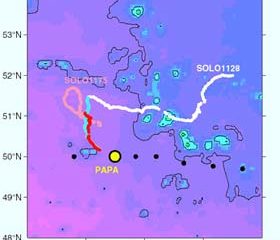
Robotic Carbon Explorers test the “iron hypothesis” in nature
In the spring of 2001, two robotic Carbon Explorer floats recorded the rapid growth of phytoplankton in the upper layers of the North Pacific Ocean after a passing storm had deposited iron-rich dust from the Gobi Desert. The carbon measurements, reported in the October 25 issue of Science, are the first direct observation of wind-blown terrestrial dust fertilizing the growth of aquatic plant life.
A group of scie

The development of drugs to combat some of the world’s most serious parasitic diseases is a step nearer with the discovery of a widely-shared gene that helps parasites to invade host cells.
The new understanding of the gene’s role in the single-celled parasite Toxoplasma gondii gives scientists a target to block that could stop the parasite literally in its tracks.
In experiments reported today in the journal Science, researchers at Imperial College London and the Univer

This project has been proposed in the doctoral thesis of professor Igor Egaña Santamarina of the Public University of Navarre, called “Design of complete mould QFT multivariable controllers”. Professor Mario Garcia Sanz, from the Department of Automation and Computer Science of the Public University of Navarre, has supervised the project.
Air traffic controllers and wind generator controllers
Control engineering involves the design of mathematical laws that modify the way i

A project which aims to make laboratory-grown leukaemia cells change form and then be used to prime a patient’s own immune system to kill off malignant cells has begun in Edinburgh. If successful, the study could give clinicians a way of destroying residual leukaemic cells which are undetectable by microscope. The findings could be helpful in the treatment of acute myeloblastic leukaemia (AML), one of the most common forms of leukaemia in adults.
Although about 70% of patients with AML achie

Get ready to rewrite those biology textbooks – again. Although the “lowly” blue-green algae, or Cyanobacteria, have long been credited as one of Earth’s earliest life forms and the source of the oxygen in the early Earth’s atmosphere, they might be neither.
By creating a new genetic family tree of the world’s most primitive bacteria and comparing it to the geochemistry of ancient iron and sulfur deposits, Carrine Blank of Washington University has found evidence that instead of Cyanobacter

The relationship between rocks and our health, and new methods for farming and countryside management to both encourage wildlife and make a profit, are just two of the exciting research projects highlighted in the latest issue of Planet Earth, the quarterly journal of the Natural Environment Research Council (NERC).
The rock diet
Rocks are a vital source of the essential elements and minerals people need to stay healthy. The British Geological Survey (BGS) together with part

– new calculation confirms standard model of particle physics. Contribution of hadronic vacuum polarization determined with unprecedented accuracy. The magnetic moment of the muon is an important precision parameter for…
Technique may prevent formation of unwanted waves that siphon off needed energy. Heating plasma to the ultra-high temperatures needed for fusion reactions requires more than turning the dial on a…

An international team of astronomers, led by researchers from the Astronomical Observatory of the University of Warsaw, have identified a new class of cosmic X-ray sources. The findings have been…

Antibody that Neutralizes Inhibitory Factors Involved in Nerve Regeneration Leads to Enhanced Motor Function after Acute Spinal Cord Injury. Researchers at 13 clinics in Germany, Switzerland, the Czech Republic and…

How the body’s natural killer cells could fight leukemia. Every year, some 13,000 people in Germany are diagnosed with leukemia. Despite intensive chemotherapy, around one in two of them die….

… eco-friendly reactor converts air and water into ammonia. Producing enough ammonia to feed the world comes with a large carbon footprint;. process described in new UB-led study could help…

How simulations help manufacturing of modern displays. Modern materials must be recyclable and sustainable. Consumer electronics is no exception, with organic light-emitting diodes (OLEDs) taking over modern televisions and portable…

“Neurons that fire together, wire together” describes the neural plasticity seen in human brains, but neurons grown in a dish don’t seem to follow these rules. Neurons that are cultured…

The quest for sustainable energy solutions has been a major focus of scientific research for decades. Solar energy, a clean and renewable source, has emerged as a promising alternative to…

With a processing speed a billion times faster than nature, chip-based laser neuron could help advance AI tasks such as pattern recognition and sequence prediction. Researchers have developed a laser-based…

New technology could remotely identify various types of plastics, offering a valuable tool for future monitoring and analysis of oceanic plastic pollution. Researchers have developed a new hyperspectral Raman imaging…

Artificial Intelligence (AI) has established a strong presence across industries, large and small. The “VoBaKI” research project has empowered small and medium-sized enterprises (SMEs) with an innovative tool to independently…